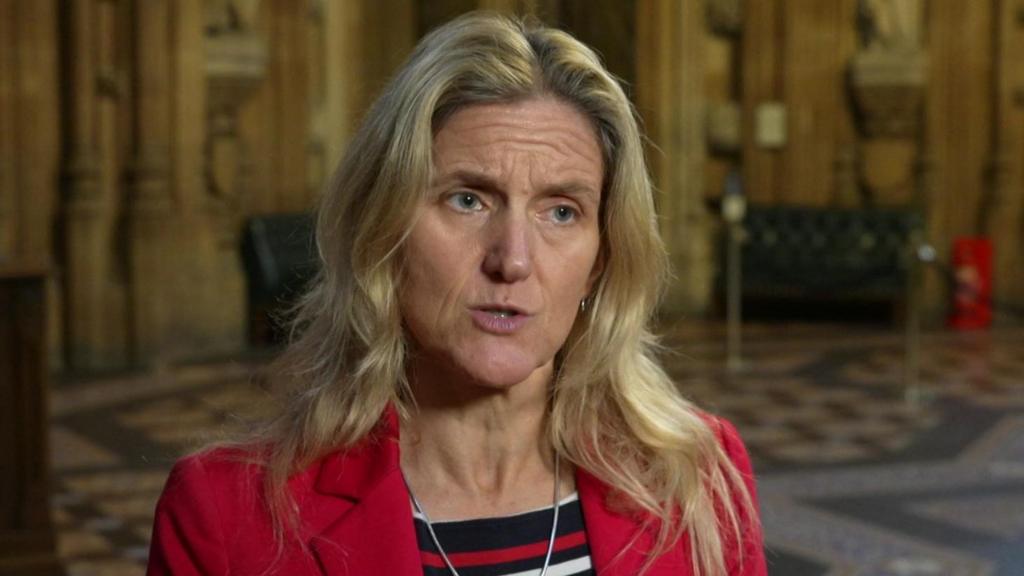“`html
The Labour MP sponsoring the bill to legalize assisted dying in England and Wales has expressed concern that some members of the House of Lords are attempting to “frustrate” its passage into law.
Kim Leadbeater cautioned that the legislation is approaching a “crucial juncture” following a surge to over 1,000 in the number of proposed amendments in the Lords.
The bill, having been approved by MPs in a landmark vote in June, requires ratification by both Houses of Parliament before it can be enacted.
However, parliamentary peers are progressing slowly with its scrutiny, suggesting that unless the pace increases, additional debating sessions will be necessary to prevent the bill from running out of time.
Critics and opponents of the bill maintain that the legislation demands significant revision to safeguard vulnerable individuals adequately.
The Terminally Ill Adults (End of Life) Bill cleared its initial stage in the Lords in September, but it will only become law if both MPs and peers reach consensus on its final wording before the current parliamentary session concludes in the spring.
Peers have so far deliberated on fewer than 30 amendments during two of the four days allocated for the committee stage, when the bill undergoes detailed examination.
The bill’s progress has been complicated by the fact that it was introduced by Leadbeater, a backbench MP, rather than by the government, making it susceptible to delays due to insufficient debating time.
On Friday, the entire four-hour session was dedicated to discussing a group of 21 amendments focused on safeguards aimed at preventing coercion or pressure for assisted death.
Following Friday’s debate, Leadbeater told the BBC that she respects those with reservations, noting that most peers have been “engaging in good faith” and “I know the Lords want to do a good job”.
However, she added that some of the debate in the Lords had been “repetitive,” and certain issues raised by peers had already been “discussed at length” by MPs.
Asserting that “in practice, the protection is there,” she expressed concern that “some of the processes and procedures that can be used are being used to frustrate the bill, and that is deeply disappointing and upsetting.”
A similar bill to legalize assisted dying failed to pass in the Lords in 2014; however, unlike Leadbeater’s bill, it had not previously secured approval from MPs.
Leadbeater said she was “concerned” about the possibility of the Lords attempting to block a bill after the Commons had already “voted to change the law”.
Stating that “now is the time” to update the law, she asserted that “the Lords have to respect that, and we have to respect democracy”.
The legalization of assisted dying was not included in the manifestos of any major parties before last year’s general election, and parties have agreed to treat it as a matter of conscience, allowing MPs to vote according to their personal beliefs.
During the earlier debate, prior to Leadbeater’s comments, former DUP leader Baron Dodds of Duncairn argued that the bill required further modifications to ensure “that all the necessary safeguards” were in place.
He further commented that the Lords would not need to dedicate so much time to the bill “had some of these issues been dealt with in a different way” by MPs.
Former High Court judge Elizabeth Butler-Sloss echoed this sentiment, telling peers: “There are many of us who do not like the bill, but there is a real probability that the bill will pass, and if it passes, we want it better than it is at the moment. Consequently, we are not wasting time.”
Lord Goodman, a Conservative peer who has proposed several amendments to the bill, stated that it had been passed by the Commons “without any of the necessary detail” regarding its implementation.
He said that professional groups have criticized the “shocking state” of the legislation and called for peers to conduct thorough scrutiny and propose amendments.
“Protecting vulnerable people from dying against their wishes, preventing abuse and stopping an enormous burden on the NHS are hugely important goals that we would imagine all would share,” he said.
Ministers have ruled out using governmental debating time to enable further discussion of the amendments in the Lords but have hinted at exploring other means to provide more time.
According to the Hansard Society, a think tank, possible alternatives include additional sittings on Fridays, a day traditionally reserved for debating bills introduced by backbench MPs.
Other alternatives include using time that would normally be reserved for other subjects, or sitting for longer hours between Monday and Thursday, it added.
Sign up for our Politics Essential newsletter to keep up with the inner workings of Westminster and beyond.
Helen Newlove fought tirelessly for crime victims following the murder of her husband Garry in 2007.
Baroness Helen Newlove has been remembered as a commissioner who stood up for all victims.
Lord Sahota blames a “toxic political environment” for a spate of crimes in the West Midlands.
Baroness D’Souza sought to influence Met chief Sir Mark Rowley, a Lords report found.
The project to rebuild an entrance into Parliament ran over budget and over time by 100 weeks.
“`

